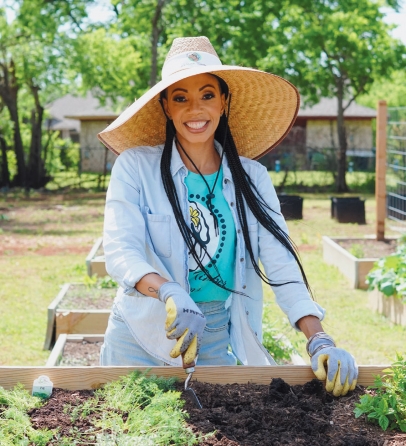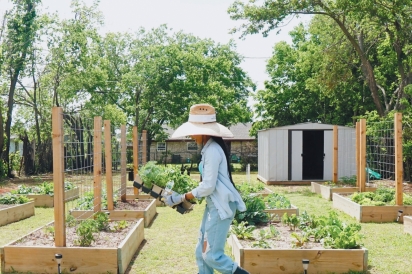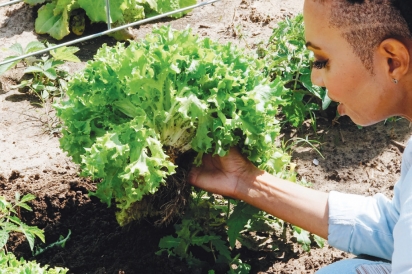Lillian Timber Farms
LaTasha Timberlake Brings Lessons Learned Abroad Back to Oklahoma City.
“Did you ever think you’d see people growing peanuts in the ‘hood?” LaTasha Timberlake jokes with her easy laugh while walking down a row at the community garden just south of northeast 21st and Lottie, maintained by Lillian Timber Farms and its volunteers. As I bend down to help plant the starts of various vegetables and herbs, I introduce myself to the woman standing next to me. “My name is Susan,” she responds, pausing for comedic effect. “‘Susan,’ the doctor said, ‘you gained too much weight during the pandemic so you better get outside and do something!’” she concludes with a chuckle. A half dozen local businesses, knighted “Seed Surrogates'', have been growing these plant starts from seed in their buildings since early March and are now planting those seedlings with other community volunteers. This sets the friendly collaborative tone of the “Work Party” held by Lilliam Timber Farms at their “Lottie Lot” on a warm mid-April morning.
It’s one of several gardens in Oklahoma City managed by LaTasha and her team. During the pandemic, they reached out to businesses and neighborhoods with unused space or languishing gardens, determined their needs, and worked with those groups to bring their spaces and gardens back to life, most recently invigorating the Medical Community Neighborhood Association's garden and the Lottie Lot. In a time dominated by memories of a bleak winter, Lillian Timber Farms had people outside, engaged with each other and nature.
LaTasha takes her style from the rhythms of growing food. “It’s about patience. It’s about discipline.” This approach guides everything from her organizational philosophy to the Lillian Timber t-shirts that read “Change Begins With What We Eat.” The name Lillian Timber even represents the ebb and flow of time. Lillian Newton was LaTasha’s grandmother and Timber is a shortened version of her last name. “She taught me how to cook at age seven,” says LaTasha. “I didn’t know we were eating poor people’s food. But, we never missed a meal, even if it wasn’t the healthiest.” Since then she has travelled around the world and landed back in OKC to build human capacity and institutions focused on physical and emotional health.
Born and raised in the same area as greats like Charlie Christian and Ralph Ellison, LaTasha grew up in the John F. Kennedy neighborhood of Oklahoma City. “Growing up, my neighbors were female police officers, black firefighters, and lots of mentors,” she recalls. After attending Dunbar Elementary, she moved with her mother to Indianapolis, Indiana and attended a magnet high school. “It felt more like a college campus. There were two thousand students, professional and technical opportunities, and all in a larger school.” One of those opportunities that changed her life was the Model United Nations program, a program that brings together students from all over the United States to assume roles as ambassadors from member nations. “That got me interested in understanding the global issues affecting the world.” Her high school experiences combined with a mother working in nonprofit management primed LaTasha for a life of working with people and building institutions.
After participating in Model UN and traveling through Europe for a short period, LaTasha returned to Oklahoma, attending Langston University where she obtained her bachelor of arts in English Education. She took that education and put it to work teaching at all girls schools in Gambia, where she would visit her students’ homes at the end of the day. This experience was formative in learning that time is one of her greatest resources to give. “[There] you have students who have to pay to be publicly educated and still have fewer resources than most. It quickly opened my eyes that as an educator, teaching occurs from within us and not always from materials. I wanted them to see how important their education was to me, so they could believe it themselves. It allowed me to understand different ways that people live, what culture looks like, and how to practice community. It allowed me to really know who I was, my purpose, and my work.”
After working and traveling in western Africa, LaTasha obtained her masters in Curriculum Instruction from Oklahoma State University. She continued her education across the globe, spending three years in Japan working and studying Japanese language and culture, two years in Indonesia and Thailand studying meditation and philosophy while at Doisuthep Vipassana Meditation Center in Chiang Mai, and two months learning traditional and sustainable farming practices in Hawaii.
These experiences crystallized her purpose. “I’ve got friends who are in their forties who have the health problems of an eighty year old. For me, it’s not changing everybody into a vegetarian or vegan. I’m not saying this is how you need to live, but you have a choice. It’s about choosing food that has lived. Being intentional with your selection and eating things that don’t make you sluggish. Food is the number one thing that keeps us in that bondage. We need to eat things that are full of life, not something that is processed or was never living.”
She left Hawaii and arrived back to Oklahoma in fall 2019 with big plans. “I was ready to start a big farm, produce food, provide jobs, and bring that to underserved communities. Then COVID hit. I had a friend who had an unused lot nearby, so I began farming in a community garden.” This is where patience and discipline factor in. “Gardening teaches us that things will regrow; they will come back. It may not look like we anticipate,” she reflects. “Some carrots come out as the ‘perfect carrot’ in terms of grocery store size and color and some come out in pairs and oddly curved, still edible and having great nutritional value. Some things are just for that time and some are not.” Where many people might give up or take a break in the face of a pandemic, LaTasha sees the big picture and moves forward step by step.
LaTasha and Lillian Timber Farms are poised to have a busy 2021 and 2022. In addition to opening three new community gardens, there will be a capital campaign, a new website, and a push towards a fully functioning farm. If that’s not enough, LaTasha is developing a multi-disciplined curriculum for youth and adults to include not only soil health and growing techniques, but cooking classes, arts, and more.
It’s all community effort, by definition. Volunteers and neighbors help plant and maintain the beds, office space was donated by a local Presbyterian church, and businesses pitch in where they can. For instance, Leap Coffee Roasters donates a portion of sales from the YYY blend to the effort. Other groups have generously offered land and supplies. Listening to LaTasha describe all of the efforts at work, it’s stunning to hear how she takes it all in stride. “The more we practice community, the more it expands. We’re all here living together in this community. I don't go to an event thinking ‘I hope 50 people show up’,” she explains. “I show up. Regardless of how many people show up, it won’t stop the work we're doing. At the end of the day that energy will travel.” Unsurprisingly, people show up.
> Lillian Timber Farms, Oklahoma City; 405-283-2234; lilliantimberfarms.org; instagram.com/lilliantimberfarms; facebook.com/LillianTimberFarms








